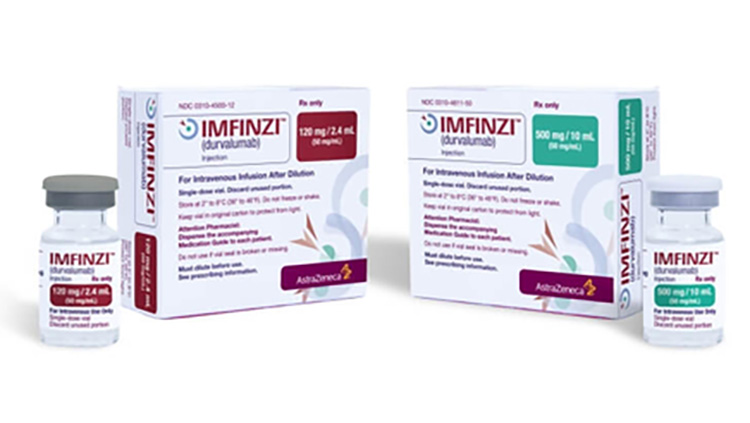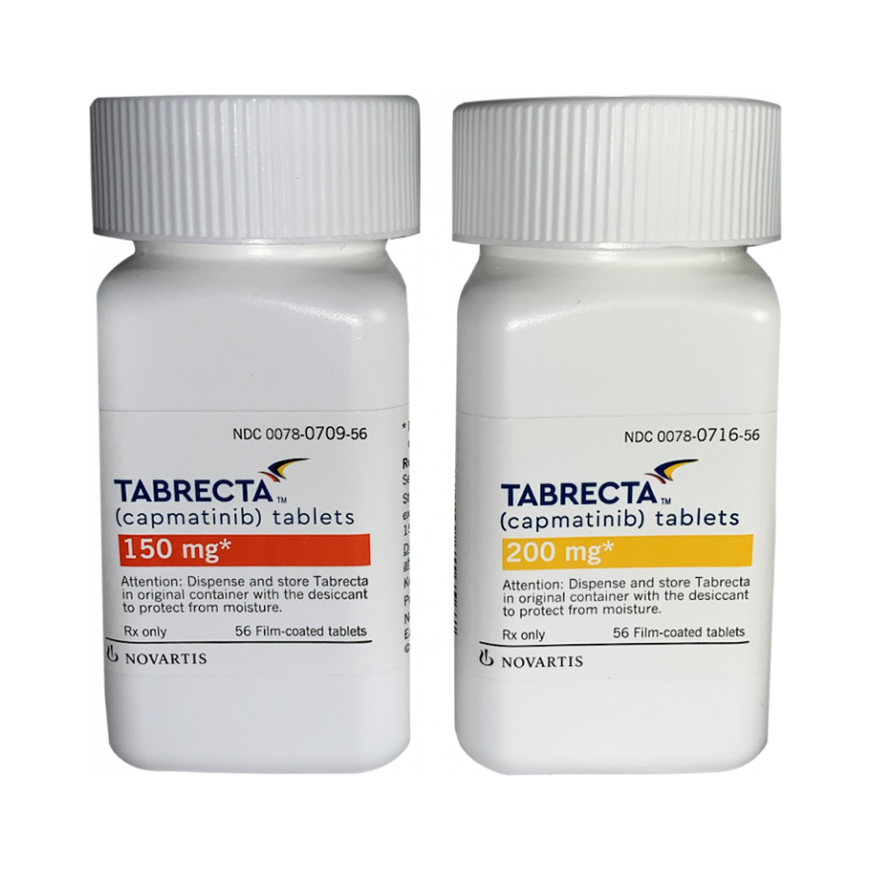Imfinzi (durvalumab) vs Tabrecta (capmatinib)
Imfinzi (durvalumab) vs Tabrecta (capmatinib)
Imfinzi (durvalumab) is an immune checkpoint inhibitor specifically targeting PD-L1, which is used primarily in the treatment of certain types of urothelial carcinoma and non-small cell lung cancer (NSCLC). It works by helping the immune system recognize and attack cancer cells. On the other hand, Tabrecta (capmatinib) is a targeted therapy that inhibits the activity of the MET gene, and is used for the treatment of adult patients with metastatic NSCLC that have mutations leading to MET exon 14 skipping. When deciding between these two medications, it is essential to consider the specific genetic and molecular characteristics of the cancer, as Imfinzi is generally chosen for a broader range of NSCLC patients, while Tabrecta is specifically for those with MET exon 14 skipping mutations. The decision should be made in consultation with an oncologist, who can evaluate the cancer's profile and the patient's overall health to determine the most appropriate treatment option.
Difference between Imfinzi and Tabrecta
| Metric | Imfinzi (durvalumab) | Tabrecta (capmatinib) |
|---|---|---|
| Generic name | Durvalumab | Capmatinib |
| Indications | Non-small cell lung cancer, urothelial carcinoma | Non-small cell lung cancer with MET exon 14 skipping mutation |
| Mechanism of action | PD-L1 inhibitor | MEK inhibitor |
| Brand names | Imfinzi | Tabrecta |
| Administrative route | Intravenous infusion | Oral |
| Side effects | Fatigue, rash, muscle pain | Nausea, vomiting, edema |
| Contraindications | Hypersensitivity to durvalumab or excipients | Hypersensitivity to capmatinib or excipients |
| Drug class | Monoclonal antibody, immune checkpoint inhibitor | Tyrosine kinase inhibitor |
| Manufacturer | AstraZeneca | Novartis |
Efficacy
Imfinzi (Durvalumab) Efficacy in Lung Cancer
Imfinzi (durvalumab) is a programmed death-ligand 1 (PD-L1) blocking antibody used in the treatment of lung cancer. Specifically, it has been approved for the treatment of patients with stage III non-small cell lung cancer (NSCLC) that is inoperable and whose disease has not progressed following concurrent platinum-based chemotherapy and radiation therapy. Clinical trials have demonstrated that durvalumab can significantly improve median progression-free survival compared to placebo, offering a new hope for patients with this particular stage of lung cancer. The PACIFIC trial, a pivotal study in this context, has shown that durvalumab treatment can lead to a substantial improvement in overall survival as well, marking it as an effective option for maintenance therapy in this patient population.
Despite its efficacy, the response to durvalumab can vary based on the expression level of PD-L1 on tumor cells. Patients with higher PD-L1 expression tend to have a better response to the treatment. However, durvalumab has been shown to provide benefit across a broad range of PD-L1 expression levels, which is encouraging for its use as a standard-of-care therapy for stage III NSCLC patients following chemoradiation.
Tabrecta (Capmatinib) Efficacy in Lung Cancer
Tabrecta (capmatinib) is a kinase inhibitor specifically targeting the MET gene, which can be abnormally activated in some NSCLC patients. This abnormal activation, caused by a mutation known as MET exon 14 skipping, can be a driving factor in the growth and spread of cancer cells. Capmatinib has shown promising efficacy in treating patients with metastatic NSCLC harboring these MET exon 14 skipping mutations. The drug's approval was based on the results of the GEOMETRY mono-1 trial, which demonstrated a high response rate in patients treated with capmatinib, both in treatment-naive and previously treated patients.
The trial results have indicated that capmatinib can significantly reduce tumor burden, with a notable percentage of patients achieving partial or complete responses. These responses were observed regardless of prior treatment with chemotherapy or other targeted therapies, suggesting that capmatinib is effective as both a first-line and later-line treatment option. Additionally, the duration of response and overall survival data from the trial further support the use of capmatinib in this subset of lung cancer patients, offering a targeted therapy option where previously limited treatments were available.
Regulatory Agency Approvals
Imfinzi
-
European Medical Agency (EMA), European Union

-
Food and Drug Administration (FDA), USA

-
Health Canada

-
Therapeutic Goods Administration (TGA), Australia

-
Medsafe (NZ)

Tabrecta
-
European Medical Agency (EMA), European Union

-
Food and Drug Administration (FDA), USA

-
Pharmaceuticals and Medical Devices Agency (PMDA), Japan

Access Imfinzi or Tabrecta today
If Imfinzi or Tabrecta are not approved or available in your country (e.g. due to supply issues), you can access them via Everyone.org.
How it works

Make an enquiry
Choose the medicine you want to buy, answer a couple of questions, and upload your prescription to speed things up. We’ll get back to you within 24 hours.


Make an enquiry
Choose the medicine you want to buy, answer a couple of questions, and upload your prescription to speed things up. We’ll get back to you within 24 hours.


Breeze through the paperwork
We'll guide you through the required documents for importing unapproved medicine, ensuring you have all the necessary information.


Get a personalized quote
We’ll prepare a quote for you, including medicine costs and any shipping, administrative, or import fees that may apply.


Receive your medicine
Accept the quote and we’ll handle the rest - sourcing and safely delivering your medicine.

Some text on this page has been automatically generated. Speak to your physician before you start a new treatment or medication.
Let's talk
If you have any questions, call us or send us a message through WhatsApp or email:
Contact us




